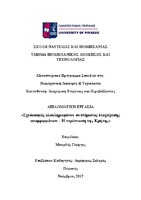| dc.description.abstractEN | Over the last decades, tourism has emerged as one of the most crucial industries. In 2011, 980
million tourists travelled outside their national borders, thus generating revenues of 710.000 million
Euros for the countries they visited. At the same time, the importance of tourism for the economy is
reflected to the fact that it represents about 12% of the global GDP (World Tourism Organization,
2012). Tourism may maintain high levels of employment and income for the economies of many
regions worldwide. Nonetheless, the tourism sector may have an impact on the environment and the
consumption of resources, resulting to problems in many sectors, such as urban and regional
planning, transportation and public health (Evci και Gulis, 2006). One of the most significant
implications of tourism is the creation of Municipal Solid Waste (MSW) (Holden, 2008). A series of
studies have reported the increase of MSW following the increase of seasonal population in tourism
areas (Shamshiry et al., 2011; Espinosa- Llorιns et al., 2008; The and Cabanban, 2007). Therefore, of
great significance for these areas is the collection, transfer and processing of MSW in an
environmentally efficient and cost-effective manner (Chen et al., 2005).
Tourism is presently one of the largest industries in Greece as well. Every year, an increase of arrivals
is recorded in the country, with the islands as the main destination, which leads to the multiplying of
the numbers of tourists, particularly during the summer season. Nevertheless, despite the obvious
benefits of tourism for the country and the significant contribution to the national GDP at a period
when the national economy goes under deep recession, there also exist environmental
consequences that need to be studied in order to be minimized. In this context, one issue of great
importance is waste management in the islands given that –as mentioned above– Greece’s economy
is based on tourism. The appropriate management of both liquid and solid waste need to be
seriously taken into account otherwise, the islands face the risk of becoming dumping grounds, with
severe consequences both for tourism and public health. At the same time, the separation of
recyclable materials is particularly necessary in the small islands, as these are environmentally more
vulnerable to the increase of solid waste quantities and, thus, any health hazards may spread more
rapidly (World Health Organization, 1996).
In this paper, we focus on the island of Crete in order to examine the issue of Municipal Solid Waste.
Due to the rapid seasonal population increase, what is required is the detailed calculation of the
exact volume of solid waste, in order to proceed to a rational selection of a solid waste management
system, based on actual data that incorporate the significant parameter of tourism. From this
perspective, we need to explore methods that are based on the operation of the cyclical economy.
The pilot system already implemented in the city of Sparta is understood as a useful guide for the
appropriate management of MSW. Its goal has been the production of “zero-waste” and has been
based on recycling. Nevertheless, in the islands such management is difficult to implement due to the
large population changes resulting from tourism. This problem has been addressed by the study
elaborated in Merorca. Through a combination of various data, this study attempted to predict the
production of MSW caused by tourists. Another study elaborated in Mallorca (a mainly tourist island)
mentions a waste management plan promoted through public-private partnerships and the
challenges that came up. This is a model that calls for further examination, given the similarities
between Mallorca and Crete.
In turn, following an analysis of the existing waste management system in Crete, the paper will
propose a new waste management system, also recording advantages and disadvantages. | el |



